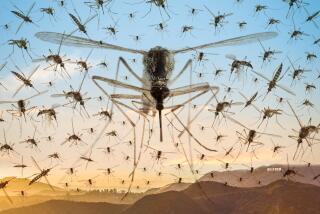AIDS Virus Infects Many Insects in Africa, Scientist Says
- Share via
A leading French scientist has found that many insects in central Africa are infected with the AIDS virus and that such insects may be able to transmit the disease to humans in certain regions, it has been reported.
In an interview with the Reuters news agency in Paris, Dr. Jean-Claude Chermann of the Pasteur Institute said he had tested mosquitoes, cockroaches, ticks, tsetse flies and other insects from Zaire and the Central African Republic and found most of them to be infected with the virus.
It has been speculated for some time that mosquitoes might be an agent in transmitting the acquired immune deficiency syndrome--in much the same manner as sharing a contaminated needle has been shown to be a major risk factor in the spread of AIDS.
“This means that insects can be contaminated and could therefore form a natural reservoir for the AIDS virus,” Chermann told Reuters. “They may be a possible mode of transmission for the disease in Africa but the question is still open, as we do not have sufficient epidemiological information.”
Chermann said that virtually all of about 50 insects he studied from Zaire were carrying the virus, but only ticks and mosquitoes out of 30 insects studied from the Central African Republic showed any trace of the virus.
Chermann works with the French team that is a co-discoverer of the AIDS virus, along with U.S. researchers at the National Cancer Institute. He said a paper on the African research is due to be published later this week in the Proceedings of the Paris Academy of Science.
Chermann could not be reached Monday. His report drew skepticism from some American AIDS researchers.
Dr. Bruce Francy, an insect specialist at the Centers for Disease Control’s facility in Fort Collins, Colo., expressed skepticism that insects can transmit the AIDS virus in Africa or the United States--even if it becomes well established that some insects are capable of carrying the virus.
He cited several reasons why entomologists doubt that insects, especially mosquitoes, could be efficient transmitters of the AIDS virus to humans.
It is well established, he said, that the amount of the AIDS virus in the blood of infected humans is small. And considering the minute amount of blood that an insect typically draws, the chances that it will suck in a virus “seem virtually nil,” Francy said.
Asked to speculate as to how AIDS conceivably might be transmitted by insects in Africa but not in the United States, he said that one possibility may be the difference in the intensity of insect bites there and in this country.
In parts of Africa, he said, an individual may be bitten 200 to 300 times during the night--thus increasing the chances that a mosquito might pick up infected blood--as compared to a much smaller number of bites in the United States “But I’m not saying that is a logical explanation,” he said.
The behavior of mosquitoes after sucking blood also makes such transmission unlikely, he said. Typically, mosquitoes feed only until they are full and will not feed again for three or four days, after they lay eggs and then search for another blood meal.
And by then, the virus may no longer be present on the mosquito’s mouth, he said.
In Africa, only 5% to 10% of mosquitoes live more than 10 days, Francy said.
Although other kinds of insects, such as bedbugs, consume larger amounts of blood than mosquitoes, Francy said that researchers at the Fort Collins center have been unable to isolate the AIDS virus in common bedbugs that had been fed AIDS-virus contaminated blood.
Present Testing Methods
Francy also was skeptical that anybody had been able to isolate the virus in such a variety of insects that Chermann was reported to have done--unless a test that is more sensitive than the methods now available has been developed.
He said that although certain insects have been reported as carriers of the virus that causes hepatitis B, a disease whose modes of transmission resembles AIDS, experiments in which chimpanzees were bitten by mosquitoes carrying the hepatitis B virus failed to develop the disease.
In Belle Glade, Fla., a town that has the highest per-capita rate of AIDS cases in the United States, Dr. Mark Whiteside has asserted that AIDS virus-carrying mosquitoes may be part of the problem. Last February the Centers for Disease Control launched an extensive study in Belle Glade intended in part to explore Whiteside’s speculation.
No Correlation Seen
But according to Dr. Harold Jaffe of the Centers for Disease Control and Dr. Ken Castro, the project director, a preliminary look at the results of the study to date indicates no correlation between mosquito bites and AIDS. As in other parts of the nation, the disease appears to be transmitted during sexual intercourse or, in intravenous drug users, by the exchange of virus-contaminated needles, they said.
Proponents of Proposition 64 on the California ballot in November, who advocate quarantining AIDS patients and maintain that insects are one mode of AIDS transmission, have cited papers written by Whiteside as support for their belief.
In a telephone interview, Whiteside said he allowed the proposition supporters to use his name only because they share his belief that the disease “probably” is transmitted by insects in the tropics.
But he said he disagrees with another notion supported by the proposition’s backers that AIDS can be passed from person to person by casual contact and that he does not believe in quarantining AIDS patients.
“I do not endorse Proposition 64 in California, but I feel obligated to comment on insect transmission,” Whiteside said.
More to Read
Sign up for Essential California
The most important California stories and recommendations in your inbox every morning.
You may occasionally receive promotional content from the Los Angeles Times.













